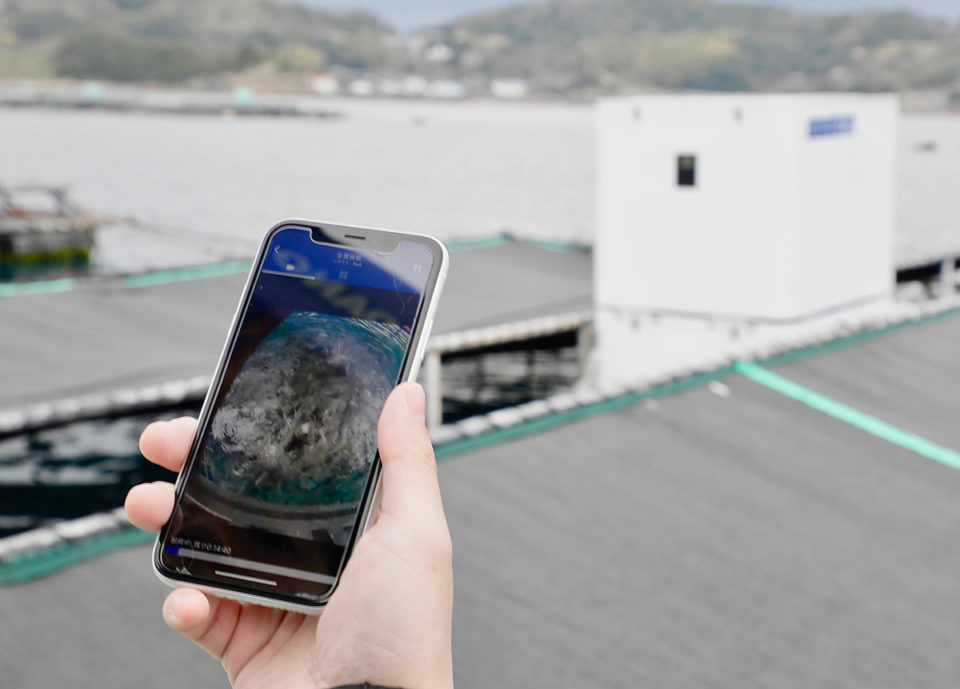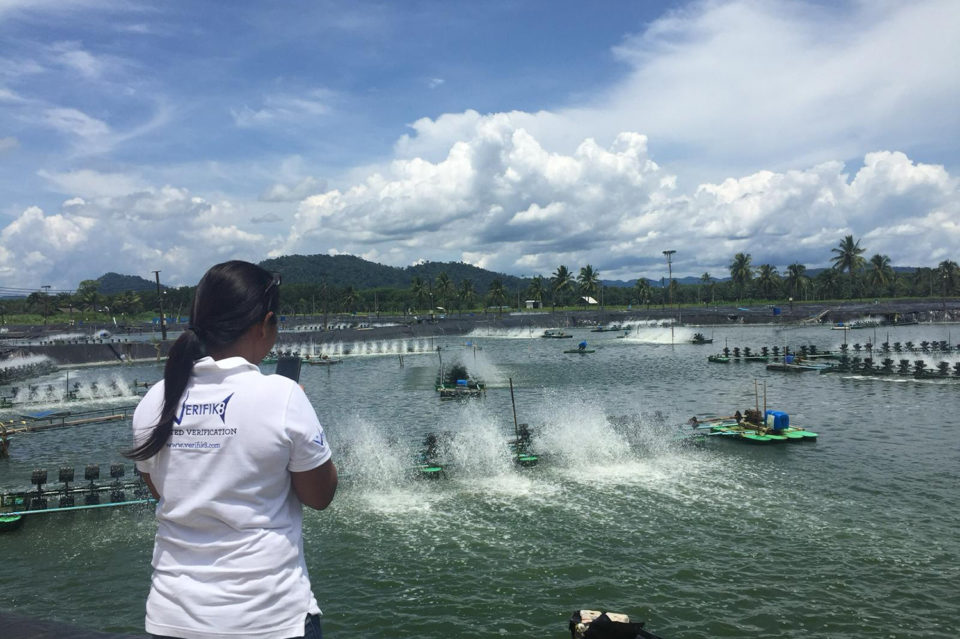Algorithm makers and data scientists rally solutions for farmers, even when they’re not able to be near the farm

As the coronavirus pandemic continues to disrupt, can technology and artificial intelligence (AI) help aquaculture find the way forward?
Market disruption, reduced or suspended production and declining seafood demand are among the many impacts on aquaculture as COVID-19 carries on. Innovative companies, many of them still bearing the “startup” label, are offering support with a host of initiatives.
In India, full-stack aquaculture technology startup Aquaconnect has launched a COVID-19 helpline for shrimp farmers. The company is providing remote support on farm management and helping farmers navigate supply, demand and logistics. It’s also joining forces with processors and exporters to put farmers in touch with those who are still buying shrimp.
“We’re aiming to provide complete assistance and information to farmers during this pandemic. We believe that our collaborative effort with other industry stakeholders will help them mitigate the challenges from the country-wide COVID-19 lockdown,” Aquaconnect CEO Rajamanohar Somasundaram told The Advocate.
With many restaurants closed or with fewer customers practicing social distancing according to applicable health guidelines, sales in Japan are declining. Because seafood products are often more expensive, customers are cutting back discretionary spending or purchasing more non-perishable foods.
In light of this, aquaculture technology provider Umitron is helping fish farmers in Japan adjust to new market conditions. A crowdfunding campaign with Akasaka Fisheries, a red sea bream farmer, is connecting consumers directly with farmers to raise awareness about sustainable farming methods. When Japan lifts its state of emergency, customers will be able to visit restaurants serving Akasaka Fisheries products, watch videos and obtain information on the fish they’re eating. This will offer some relief to participating farmers and restaurants, said Andy Davison, product manager at Umitron.

“We want to share farmers’ stories and open customers’ eyes to the hard work and dedication that goes into growing high-quality seafood. Making customers aware of farmers’ struggles is the first step in generating more help,” he said.
As more farmers stay at home to comply with social distancing regulations, Umitron’s automated smart feeder CELL is proving advantageous. The device collects data to optimize feeding and is remotely managed through a cloud-based application on a mobile device. This allows farmers to feed and monitor their fish without being on their farm. Remote access to data, forecasting and integration with data logging hardware and automatic feeding systems are likely to go a long way to help reduce farm dependency on human labor.
Aquaculture may become even more data-driven and adopt technology which will benefit farmers and consumers by ensuring traceability and creating transparency.
“We’re happy that CELL can give farmers added flexibility during this challenging time, even if some in-person work is still required during a prolonged period of disruption such as this,” said Davison.
Canadian smart-farming company Wittaya Aqua is also helping to reduce the requirement for farmers to be on site as often. Its cloud-based Big Data platform – Wittaya AquaOp – works for multiple species by accurately forecasting growth trajectories and feed requirements. Farmers can make decisions early to slow down production until markets rebound, while feeding strategies help them reduce the amount they’re feeding their animals (thus reducing costs spent on feed) and lengthen the growing period by slowing the growth of their animals (reducing the need to cull animals) until prices rebound.
“Our models and algorithms are accurate for long periods of time with little input from farms,” said Evan Hall, cofounder of Wittaya Aqua. “As well as helping farms run as normal, we’re looking to partner with other companies that deliver smart-farming solutions to bring farms a more holistic package.”
https://www.aquaculturealliance.org/advocate/the-coronavirus-pandemics-influence-on-aquaculture-priorities/
Difficulties in selling have left farmers with no choice but to delay harvests, which means that they’re sitting on stocks that cost money to keep with a lot of uncertainty about the future, said Flavio Corsin, Aquaculture Program Director at IDH, the Sustainable Trade Initiative. But technology and AI can also model production versus prices so that advice can be given on the most profitable strategies such as when to harvest or what would happen if a farmer waits. It can also provide information on how to reduce disease risks, data on market needs and prices, and information for financial institutions so that they can provide financing to farms.
“Some of the companies we work with provide services to farmers and value chain players and are well-connected in the aquaculture industry. They’re now in a position to support farmers in finding markets in these challenging times, or to swiftly transfer information from the government to farmers. This may increase the resilience not only of the farmers but also of the aquaculture industry itself,” said Corsin.

Juliette Alemany is a data scientist and project manager at VerifiK8, a Bangkok-based consultancy that specializes in improving supply-chain sustainability through technology. Although farmers in Thailand are unable to sell as many products as before, those who have adapted to technology will have an advantage, she said. In addition to identifying new, international sales channels by helping stakeholders improve their supply chain sustainability, VerifiK8’s web and mobile application supports traceability and audit readiness for certification. With a potential long-term effect on consumer behavior and more awareness of responsibly produced food, Alemany believes that certification will play an increasing role in aquaculture, and farms are likely to take swift action to achieve it, or a certain level of compliance, to mitigate potential risks.
“With auditors unable to carry out on-site audits, now is the time to reflect on how technology can support compliance. It can greatly contribute to reshaping the certification landscape by providing solutions to remotely verify data and increasing the efficiency of the auditing process,” she said.
The coronavirus pandemic may not stop anytime soon. But it could make aquaculture stakeholders reconsider a host of areas such as hard-to-predict risks and biosecurity. As new viruses commonly arise in aquaculture in the same way that COVID-19 arose in the human population, the pandemic should force farmers to come up with risk management and crisis plans.
Stakeholders may also realize the issues of disrupted supply chains, and the need to strengthen bonds between farms and processors, said Alemany.
“In Vietnam, we are seeing farmers afraid of market fluctuation and reluctant to stock,” she said. “This will lead to a shortage of shrimp and fish for processing plants, but each stakeholder must connect to go through the bad (and good) times. Connection and trust among farmers, processors and buyers is key. Hopefully the pandemic will improve the relationship balance among supply chain stakeholders and support better communication through technology.”
“Aquaculture may become even more data-driven and adopt technology which will benefit farmers and consumers by ensuring traceability and creating transparency,” said Corsin. “A better understanding of the risk factors for disease and the need for biosecurity will help control disease, and we may see an increasing reliance of the local market on local production.”
Follow the Advocate on Twitter @GAA_Advocate
Now that you've finished reading the article ...
… we hope you’ll consider supporting our mission to document the evolution of the global aquaculture industry and share our vast network of contributors’ expansive knowledge every week.
By becoming a Global Seafood Alliance member, you’re ensuring that all of the pre-competitive work we do through member benefits, resources and events can continue. Individual membership costs just $50 a year. GSA individual and corporate members receive complimentary access to a series of GOAL virtual events beginning in April. Join now.
Not a GSA member? Join us.
Author
-

Bonnie Waycott
Correspondent Bonnie Waycott became interested in marine life after learning to snorkel on the Sea of Japan coast near her mother’s hometown. She specializes in aquaculture and fisheries with a particular focus on Japan, and has a keen interest in Tohoku’s aquaculture recovery following the 2011 Great East Japan Earthquake and Tsunami.
Tagged With
Related Posts

Intelligence
COVID-19 has the West Coast shellfish sector on hold
The impacts of the coronavirus (COVID-19) pandemic on the industry are vast. In the Pacific Northwest, some producers are faring better than others.

Health & Welfare
How can Norway defeat pancreatic disease in salmon? By detecting it faster.
Polish pathogen diagnostics group will soon launch a test system that can identify the costly pancreatic disease (and six others) in just 10 minutes.

Innovation & Investment
The coronavirus pandemic’s influence on aquaculture priorities
There are lessons to be learned for aquaculture amid the coronavirus pandemic that's impacting life and business at every level. We explore a few perspectives.

Aquafeeds
After testing new feed ingredients, Thai Union finds reluctant uptake
The company has engaged in feed trials with both algae and microbial meals, before its sustainability director said farmers, “by and large, don’t want it.”

